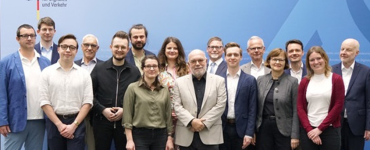Oliver J. Süme, eco Chair of the Board calls for a change of perspective in the digital policy debate: The handling of digital technologies must become more pragmatic and at the same time, more strategic. What is missing is a visionary master plan – ideally devised by a digital ministry.
Looking back over the past decade, what is particularly striking is that the approach to digital transformation in Germany was characterized in the main by technology pessimism and by muddled activism in the area of digital policy legislation. But this doesn’t just concern Germany; it applies to the whole of Europe. The start of a new decade therefore seems to me to be an apt time to appeal for a U-turn in our approach to and perspectives on digitalization. My stance is that digitalization will only succeed if we drive it forward in a responsible manner.
In my view, responsible digitalization manifests itself on three levels:
Firstly, regulation with a sense of proportion: one that both formulates the legal framework conditions and protects fundamental personal rights without blocking entrepreneurial innovation or innovative business models. An important principle here should be that, even in the online sector, responsibility for law enforcement always lies with the state and must never be foisted solely onto Internet companies.
The plans to combat hate crime that emerged at the end of 2019 and the associated amendment of the controversial German Network Enforcement Act (NetzDG) unfortunately do not stand as successful examples of a constructive digital policy – nor do blanket data retention or state Trojans.
Secondly, the ability to undertake self-determined digital activities. First and foremost, this means a modernized, functioning education and further training system that equips not just students, but also employees of all ages, with the fundamental digital knowledge and skills required for a fully-informed and responsible use of digital technologies. It must also be possible to act with digital sovereignty at the level of the digital infrastructures themselves. It is therefore right and important that initiatives such as GAIA-X give data center operators and cloud infrastructure providers in Europe greater visibility and a stronger position in international competition in the future.
Thirdly, we need a solution-oriented and smart use of digital technologies based on ethical and sustainable fundamental values. It is not a question of using digitalization for everything that would be technically feasible; rather, academia, business, policy-makers, and civil society should cooperate more closely than ever before on the question of how we can use digital technologies to solve the most pressing challenges of our time.
One example is combating the energy and climate crisis. Instead of philosophizing about whether streaming shame is the new flight shame, we should instead look for ways to better use the innovation potential of digitalization to reduce emissions: be it through digitally connected vehicles, smart traffic control in cities, the use of artificial intelligence in production and logistics, or the sensible use of waste heat from data centers by connecting them to local or district heating networks.
It is the task of politics – ideally of a digital ministry– to develop a visionary and interdepartmental master plan together with the actors from academia, business, and civil society, and then to rigorously drive such a plan forward.
It is also clear that, in addition to the visionary calls for a Digital Decade, many of the issues that were center stage in 2019 will remain topical in 2020, as the following three examples illustrate:
The long-awaited roll-out of 5G will produce a significant innovation boost for companies and users, for example in the areas of IoT and mobility. But 5G requires nationwide broadband Internet connectivity and numerous new masts for the best possible dissemination of this technology. Here it is essential that Germany makes up the ground lost in recent years as quickly as possible. Politics and the media must bring fictitious and politically-led debates about the security requirements or trustworthiness of individual network suppliers back to a substantiated and fact-based footing.
It goes without saying that the topic of data and the associated issues of data protection, data security, and data availability will continue to be high up on the digital agenda in 2020. By May 2020, the European Commission will present a report on the evaluation and review of the General Data Protection Regulation (GDPR) which entered into force in 2018. In this context, it will also be interesting to know if and when the ePrivacy Regulation will be adopted and what form it might take. The negotiations in the EU Council of Ministers on the draft ePrivacy Regulation floundered at the end of 2019. What came under the radar was the fact that the ePrivacy Regulation could lead to data protection legislation for electronic media and services being established adjacent to the GDPR – and that in some cases, the two would be incompatible. The end effect would be significant legal uncertainty for the digital economy. The call to the EU institutions can only continue to be: to work for balanced, competition-oriented, innovation-driven, and practical regulation.
Finally, the industry will closely monitor the digital policy opening serve of the new EU Commission. It remains to be seen whether Ursula von der Leyen will initiate the announced measures for AI regulation in the first 100 days. In addition, the Commission President – in cooperation with her Digital Commissioner Margrethe Vestager – would like to renew the e-Commerce Directive and establish a “cyber unit” to accelerate the exchange of information in the EU. In the second half of 2020, Germany will also assume the presidency of the EU Council. So it will be interesting to see whether Germany will succeed in setting up a planned and strategic digital policy at EU level sooner than it will at its own federal level.
Conclusion: Digital technologies offer endless possibilities and innovation potential. So far we have only availed of a fraction of these opportunities. Academia, business, politics, and civil society must together assume a greater level of joint digital responsibility. Only in this way can the digital transformation lead to success and benefits for all.
In 2020, eco is celebrating its 25th anniversary under the motto of “25 years of the Internet with responsibility”.




